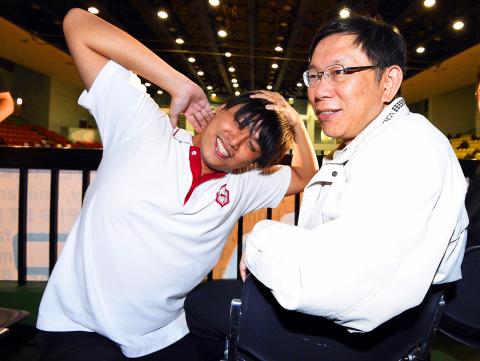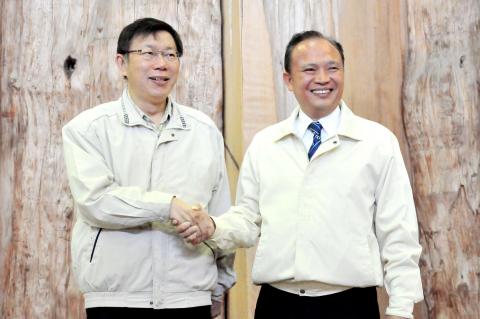Independent Taipei mayor-elect Ko Wen-je (柯文哲) yesterday triggered controversy when he said after a meeting with Yilan County Commissioner Lin Tsung-hsien (林聰賢) that a planned rail line connecting Taipei and Yilan should take the shortest route possible to save time, even though the that plan had been rejected over ecological and environmental concerns.
“Commissioner Lin and I touched on the issue of the planned new rail line between Taipei and Yilan during the meeting, and we both agreed that the rail line should take the shorter route,” Ko said after the hour-long talks at Yilan County Hall yesterday morning.
“Of course, environmental impacts are an issue, but we will leave them to be solved by the professionals,” he added.

Photo: Chen Chih-chu, Taipei Times
Ko added that if the environmental issues could be solved, then the shorter route should be chosen.
The shorter route — or “route A”— was an option when the government earlier considered constructing a direct line between Taipei and Yilan to solve traffic problems.
However, since route A would pass through an ecologically sensitive area near the Fetsui Reservoir (翡翠水庫) that supplies water to Taipei and part of New Taipei City, it was rejected.

Photo: CNA
Instead, “route B” — a curved path avoiding the area — was chosen. Route B would add 14 minutes to the trip.
Elaborating on the issue later in Taipei, Ko said that he and Lin prefer route A because of the time it could save.
“The public’s time should be an important factor to consider,” Ko said. “If route A could save 14 minutes for a traveler, and if there are 10,000 travelers taking the train a day, you would be surprised to see how much time is saved.”
He said that the route chosen by the central government was “dodging the environmental issue.”
“We should look for a way to succeed, not excuses for failure,” Ko said. “The decision [to take route B] is dodging the environmental issue; we should first try to see if the environmental issues could be solved. If they can, then we should of course choose route A. If they cannot, then we would go to route B.”
When asked whether he would accept route B if he finds that the environmental issues cannot be solved, Ko said: “We should try very hard to see if we can find a solution when we run into a problem.”

US President Donald Trump yesterday announced sweeping "reciprocal tariffs" on US trading partners, including a 32 percent tax on goods from Taiwan that is set to take effect on Wednesday. At a Rose Garden event, Trump declared a 10 percent baseline tax on imports from all countries, with the White House saying it would take effect on Saturday. Countries with larger trade surpluses with the US would face higher duties beginning on Wednesday, including Taiwan (32 percent), China (34 percent), Japan (24 percent), South Korea (25 percent), Vietnam (46 percent) and Thailand (36 percent). Canada and Mexico, the two largest US trading

ACTION PLAN: Taiwan would expand procurement from the US and encourage more companies to invest in the US to deepen bilateral cooperation, Lai said The government would not impose reciprocal tariffs in retaliation against US levies, President William Lai (賴清德) said yesterday, as he announced five strategies to address the issue, including pledging to increase Taiwanese companies’ investments in the US. Lai has in the past few days met with administrative and national security officials, as well as representatives from various industries, to explore countermeasures after US President Donald Trump on Wednesday last week announced a 32 percent duty on Taiwanese imports. In a video released yesterday evening, Lai said that Taiwan would not retaliate against the US with higher tariffs and Taiwanese companies’ commitments to

‘SPECIAL CHANNEL’: Taipei’s most important tasks are to stabilize industries affected by Trump’s trade tariffs and keep negotiations with Washington open, a source said National Security Council Secretary-General Joseph Wu (吳釗燮) arrived in the US for talks with US President Donald Trump’s administration, a source familiar with the matter said on Friday. Wu was leading a delegation for a meeting known as the “special channel,” the Financial Times reported earlier. It marked Trump’s first use of the channel since returning to the White House on Jan. 20. Citing a source familiar with the matter, the Financial Times reported that Minister of Foreign Affairs Lin Chia-lung (林佳龍) was also a part of the delegation. The visit came days after China concluded war games around Taiwan and amid Trump’s

CHIP EXCEPTION: An official said that an exception for Taiwanese semiconductors would have a limited effect, as most are packaged in third nations before being sold The Executive Yuan yesterday decried US President Donald Trump’s 32 percent tariff on Taiwanese goods announced hours earlier as “unfair,” saying it would lodge a representation with Washington. The Cabinet in a statement described the pledged US tariffs, expected to take effect on Wednesday next week, as “deeply unreasonable” and “highly regrettable.” Cabinet spokeswoman Michelle Lee (李慧芝) said that the government would “lodge a solemn representation” with the US Trade Representative and continue negotiating with Washington to “ensure the interests of our nation and industries.” Trump at a news conference in Washington on Wednesday announced a 10 percent baseline tariff on most goods